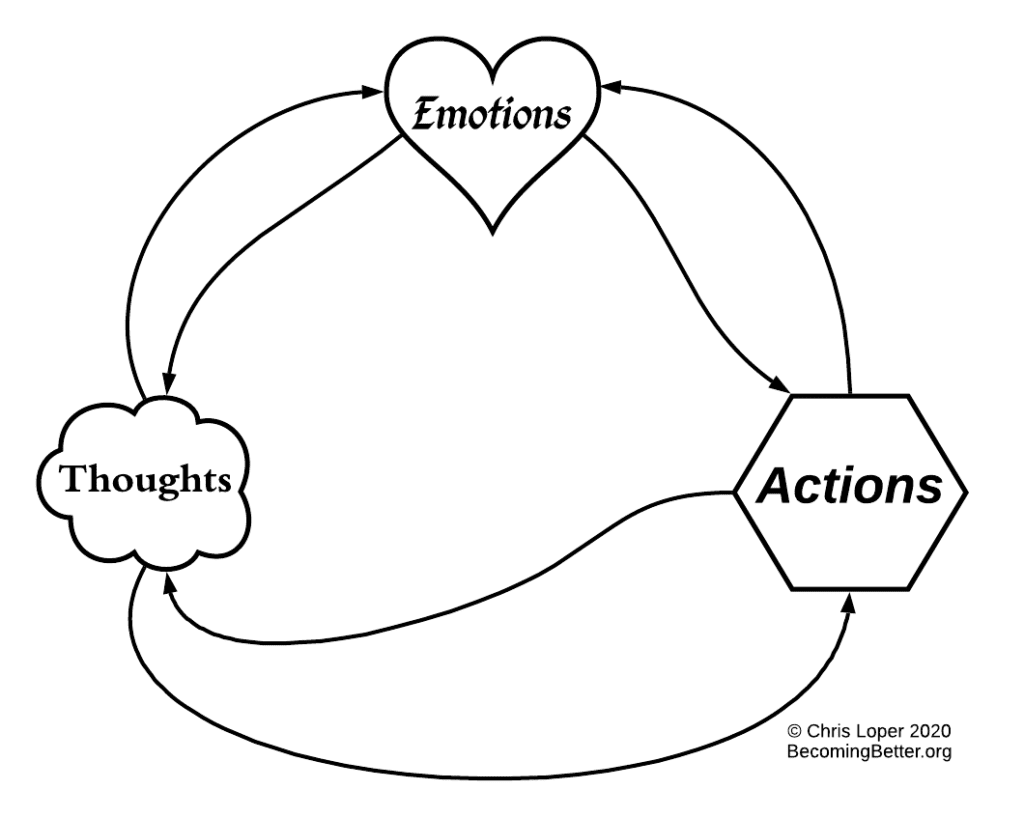
Therapy is great.
Cognitive therapy is a powerful intervention that has helped millions of people overcome depression, anxiety, and other psychological challenges.
There are many types of cognitive therapy, but most focus on helping “people learn how to identify and change destructive or disturbing thought patterns that have a negative influence on behavior and emotions.” Therapists show clients how their “automatic negative thoughts … contribute to and worsen emotional difficulties, depression, and anxiety.” Therapists also show their clients how “these thoughts are identified, challenged, and replaced with more objective, realistic thoughts.”1
This is incredibly important work to do because so many of us have habitual thought patterns and unhelpful mindsets that keep us trapped in poor emotional states and negative behaviors. Through therapy, you learn to stop self-identifying with your thoughts and feeling ashamed of the thoughts you have. You learn that you don’t have to believe or act upon everything you think. And you learn to swap out your irrational and unhelpful thoughts for better interpretations of reality.
But therapy isn’t enough.
“The trouble with most therapy is that it helps you to feel better. But you don’t get better. You have to back it up with action, action, action.” –Dr. Albert Ellis2
Dr. Albert Ellis is considered the founding father of cognitive behavioral therapy, which is one of the most successful and widely used forms of therapy today.3 The idea that a therapist’s role should be to help clients sort out their unhelpful thoughts and replace them with better ones is his main contribution to the practice of psychology. But even he thought that going to therapy wasn’t enough and emphasized the importance of taking action as well.
Doing your homework.
The first place where more action is needed is on the therapy front itself. Most patients see their counselor two to four times per month. And while they might make progress during those therapy sessions, they often stagnate or backslide between sessions.
It’s like working with a math tutor. It’s very helpful to have someone teach you the concepts and guide you through some homework problems, but you also have to follow up on that tutoring with some independent math practice. If you don’t, you’ll probably slip back down the mastery path’s muddy slope and forget the concepts. Likewise, if you don’t practice self-administered cognitive therapy when you’re on your own, you’ll forget or fail to utilize the ideas you’ve learned from your therapist.

In addition, it’s very helpful to practice other forms of thought-improvement: mindfulness meditation and loving-kindness meditation, the practice of non-complaining, journaling and gratitude journaling. All of these practices help cultivate better thinking and serve as powerful supplements to cognitive therapy.
Happiness is about more than just thoughts.
There’s a lot more to mental health than just learning to think better. In your mind, there is a dynamic interplay between thoughts, emotions, and actions:

Improving your thoughts tends to improve both your emotions and your actions, which is good, but you should also work on improving your actions.
Behavior often matters more.
Changing your behavior is at least as important as changing your thoughts. In fact, when it comes to influencing your emotions, actions speak louder than thoughts.
The positive effects of improving your behaviors can play out on multiple levels.
At the most basic level, we have your physical health. Doing the things that make your body healthier – eating well, exercising, sleeping well – also makes your brain healthier, leading to improved mental health and increased happiness.
One step deeper, we can see that making these kinds of positive changes leads to a better view of yourself. Living a healthier lifestyle leads to greater self-esteem, and self-care leads to self-love.
Finally, there might be things you’d like to do that you’re not doing: important goals you’re not working on, projects you’re neglecting, personal changes you’re not making, and dreams you’re not pursuing. And seeing yourself not doing those things is actively damaging your mental health. If you can reverse that trend and start making progress toward the life you really want to live, your mental health will naturally improve. I know from personal experience that this is the single most powerful thing you can do to feel better about yourself and your life.

When I was an addict, I hated myself for not getting sober. Once I got clean, my self-loathing and depression quickly went away. When I wasn’t moving forward in my career, I felt worthless. Once I started progressing in my professional life, I felt hopeful about my future. When I wasn’t working on the projects that mattered most to me, I felt incapable. When I committed myself to the deep work required to finish what I set out to do, I felt empowered.
Of course, behavioral change is very difficult. I didn’t change simply by resolving to change. And I didn’t change using brute-force willpower. No, no. I used a variety of effective strategies that made change easier. You should do the same.
And you don’t have to go it alone. Just as a therapist can help you with the difficult process of improving your thinking, a habit coach can help you with the challenges of behavioral change.
Consider habit coaching.
In an interview for Krista Tippett’s podcast, On Being, Harvard psychologist Ellen Langer had this to say about therapy and coaching:
“And so we have people [therapists] who can say to you, in a sophisticated way, that ‘I know how you feel. And you’ll be OK.’ But they’re not the same people who necessarily can tell you how to get on with it and what actually to do to be happy. So they can get you from being unhappy to neutral, in some sense. So what happens is, now we have a new discipline of coaches, and that’s where they take off.”4
For many people, “success” in therapy means getting from negative to neutral – getting undepressed or alleviating anxiety. But most of us want more than that. We want to thrive. We want joy. We want meaning. We want to flourish. And in the pursuit of those higher goals, therapists often have little to offer.
As a habit coach, I help people change their behavior by teaching them effective strategies and empowering mindsets. I provide guidance, accountability, troubleshooting, and a clear structure.
If you know what you want to do with your life, but you’re not doing it, I can help. Visit my habit coaching page to learn more, or simply send me an email: chris@becomingbetter.org.
You can change, and I can help.
1 Cherry, Kendra. “What Is Cognitive Behavioral Therapy (CBT)?” Very Well Mind. May 07, 2021.
2 Coyle, Daniel. The Talent Code: Greatness Isn’t Born. It’s Grown. Here’s How. Bantam Books, 2009.
3 Hofmann, Stefan G et al. “The Efficacy of Cognitive Behavioral Therapy: A Review of Meta-analyses.” Cognitive therapy and research vol. 36,5 (2012): 427-440. doi:10.1007/s10608-012-9476-1
4 “Ellen Langer: Science of Mindlessness and Mindfulness.” On Being with Krista Tippett. November 2, 2017.
